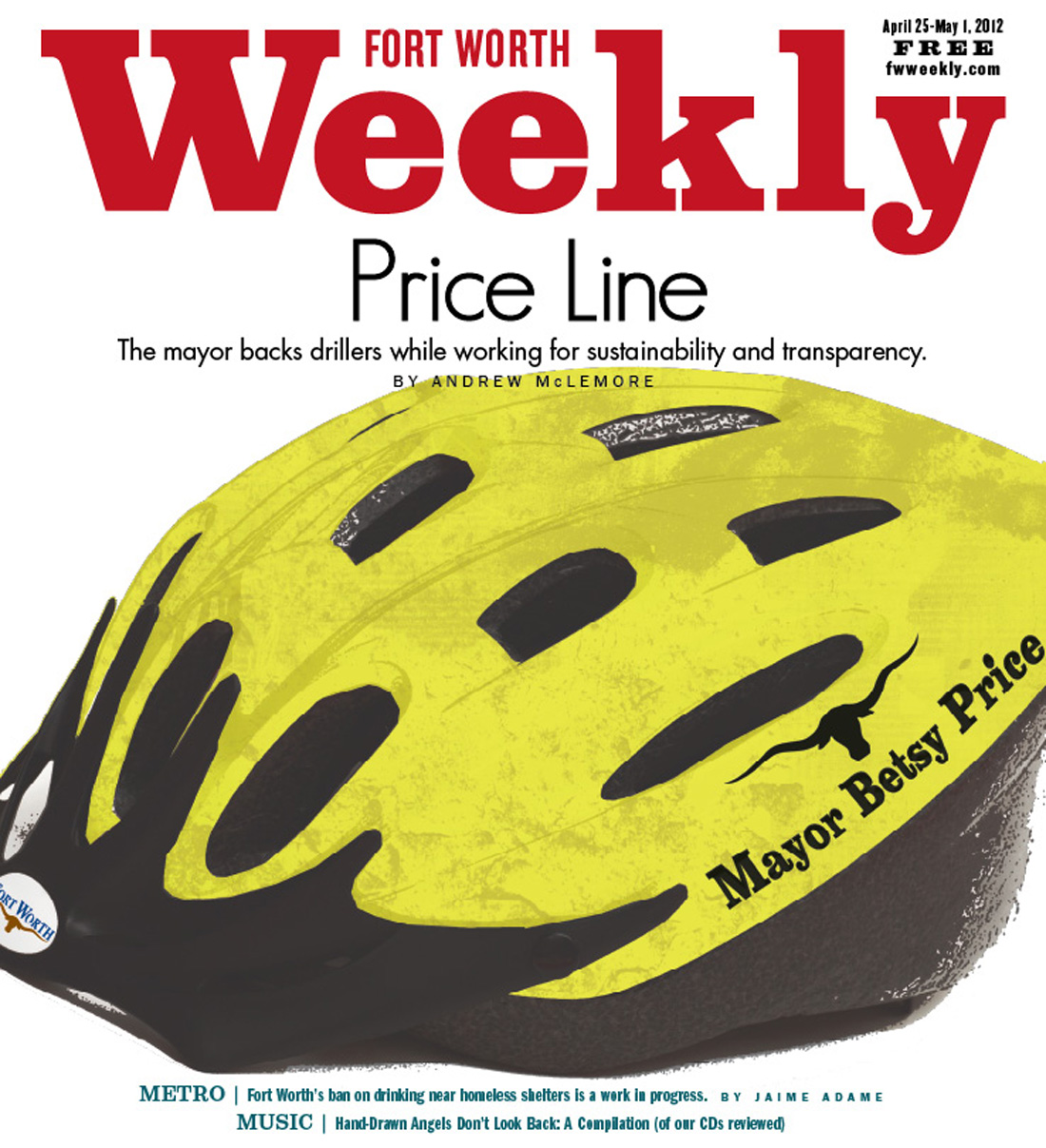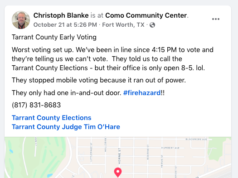Most of the Fort Worth residents who gathered outside the city council chambers felt so overwhelmed they asked for a moment to collect their thoughts before responding to questions.
There was so much patting of backs and loud congratulations that police officers asked at least three times for the group to keep their voices down.
“This is huge,” State Rep. Lon Burnam said.
“It’s nice to be on the winning side for a change,” said southeast Fort Worth housing activist Johnny Lewis, clapping Burnam on the back.
The group of residents and community leaders had been speaking out for months against the drilling of so-called saltwater disposal wells inside city limits, wells that allow gas companies to inject toxic waste deep underground. Now they were praising the “new” and “different” city council that had actually listened to their concerns instead of considering only the arguments of gas company executives.
In that April 10 meeting, council members didn’t just continue the temporary moratorium, which had been in place since 2006 and would have expired in April. Instead, they unanimously approved an outright ban.
During all five public hearings on the subject, residents who walked to the podium to express an opinion could look to the center of the dais and find Mayor Betsy Price, 62, with her short-clipped blonde hair and measured smile, thanking them for their time — a stark contrast to her predecessor, whose disapproving frown and bullying tactics had become widely detested fixtures of council meetings.
Price said afterward that she’d initially planned to vote to allow the disposal wells, but changed her mind due to the broad opposition among residents. Taking residents’ wishes into account isn’t a concept that’s been employed much in recent years by the mayor’s office.
“Under [Mayor] Moncrief, they didn’t listen,” Eastside activist and one-time mayoral hopeful Louis McBee said of the city council. “He was a champion intimidator … . This wouldn’t have happened under Moncrief.”
Most of those in the elated group outside the council chambers agreed that some credit for the victory should go to Price, who in just 10 months in office has earned the reputation of bringing civility back to the dais — if not much expectation of far-reaching changes on major issues.
The county’s tax assessor-collector for 10 years, a self-described conservative Republican, and an avid cyclist who leads “rolling” town hall meetings each week, Price vied with four other candidates in a 2011 election that ended with a run-off and a 56-percent-of-the-vote victory. She was endorsed by Moncrief and Chesapeake Energy and anointed for office by U.S. Rep. Kay Granger, another former mayor who handpicked Price to be the guardian of the massive and controversial Trinity River Vision project. Burnam and others assume that, under Price, the 7th Street Gang will still get what it wants most of the time.
“She is the most open mayor we’ve had,” said Wanda Conlin, publisher of the Greater Meadowbrook News. “To the best of her ability she’ll give you an answer. It may not be the answer you want, but you’ll get an answer.”
Civility and openness at city hall are two campaign promises that Price seems to be making good on. She’s also active on various “green” issues, going so far as personally helping to dig through garbage to publicize a recycling campaign. Her recent chastisement of the Fort Worth Transportation Authority suggests she may be ready to put her foot on the gas pedal of public transportation.
[pullquote_right]On the “politicians-I’d-drink-a-beer-with” meter, Price obviously wins the prize with these folks. [/pullquote_right]In other areas, however, campaign pledges seem to have been forgotten or put in the deep freeze.
In addressing the public health and safety concerns about gas drilling, Price joined the council in considering the issue and then doing precisely nothing. She had said she’d support the drawing of two additional council districts to better represent the city’s enormous Hispanic population — though it would also reduce downtown influence — but voted against the proposal in November.
She also talked tough about standing up to the city’s police and fire associations by holding down spending on their pensions, which critics say could bankrupt the city. That issue hasn’t come before council yet, and it’s not clear whether Price has the skills and political muscle to thrash out compromises or put together a council consensus to stand up to the most powerful voting bloc in the city.
The question still to be answered about this mayor is whether she will not only listen to residents but also raise their concerns publicly and then champion an agenda that addresses them.
Jim Lane, the former council member and current Tarrant Regional Water District board member who ran against Price last year, praises her as a “smart lady” who’s leaning hard into the learning curve of city governance. But, he said, with her one-year anniversary in office coming up in July, “The honeymoon is over.”
********
Price wears her all-black sunglasses and hot-yellow bike helmet as though they were custom-made for her. And since “Mayor Betsy Price” is stenciled across the helmet, maybe they were.
 Surrounded by about 50 fellow cyclists who showed up in Trinity Park for one of her “rolling town hall” meetings, she was clearly in her element, simultaneously chatting, hugging, and yelling out instructions to her polyester-and-spandex-clad constituents. With the toasty afternoon sun at her back, Price led the pack down West 7th Street toward the park’s bike trails. On this evening, many of the cyclists were members of local bike clubs, but she’ll ride with whomever shows up.
Surrounded by about 50 fellow cyclists who showed up in Trinity Park for one of her “rolling town hall” meetings, she was clearly in her element, simultaneously chatting, hugging, and yelling out instructions to her polyester-and-spandex-clad constituents. With the toasty afternoon sun at her back, Price led the pack down West 7th Street toward the park’s bike trails. On this evening, many of the cyclists were members of local bike clubs, but she’ll ride with whomever shows up.
A 15-mile loop later, the posse was back, sweaty and ready to settle down at Chuy’s. Price ordered nachos for her thankful cohort and sipped a margarita (on the rocks). She chatted easily, tossing out bike repair tips as readily as comments on clean air and water or self-deprecating jokes about her camera-ready smile.
On the “politicians-I’d-drink-a-beer-with” meter, Price obviously wins the prize with these folks.
Her cycling habit started 20 years ago, a decade before she was elected tax assessor for Tarrant County. The “rolling town halls” started in March and will continue through October. They are more about riding than city bidness, but Price said they’re a great way to mix with the citizenry. Sometimes, en route, she hears concerns about potholes, broken streetlights, and the like.
It was the third town hall on wheels for Fort Worth resident Diane Laughlin, who met the mayor at a bike trail ribbon-cutting last year. She didn’t vote in last year’s mayoral election, Laughlin said, but if the election were this week, her ballot clearly would go to Price.
“She’s so approachable,” said the soon-to-be-retired train dispatcher for BNSF Railroad. At the ribbon-cutting, “she tied a piece of the ribbon into a bow on my helmet. I thought that was so cute. I felt honored.”
Price’s engagement with the community is the hallmark of her administration thus far, not just through weekly bike rides but also through her frequent meetings with neighborhood associations and other local groups that had long felt ignored.
Her campaign promise for greater transparency struck a chord with residents who now see a veil being pulled back from the face of city government. And since Price spoke to Fort Worth Weekly after eight years of silence from Moncrief, it’s hard to argue against that perception.
(But spokesman Jason Lamers, who also worked for Moncrief, said Price may not grant another interview depending on “how this story goes.” The Weekly has an unfortunate habit of printing “conspiracy theories” about all those gas companies and well-intentioned members of the city council and staff, Lamers said.)
“I personally have been really impressed,” said Libby Willis, president of the Fort Worth League of Neighborhood Associations. “Countless” neighborhood groups have invited Price to speak — and she shows up, Willis said. That’s not to say that Price agrees with every opinion or bends to every complaint, but she seems at least to listen.
“Even if she disagrees, she’s not going to blast you,” Willis said. “That’s a lot of what voters are hungry for. Even if they [the politicians] don’t do what you want, you think, ‘Well at least she listened.’ ”
Price has even appropriated social media like Facebook and Twitter as ways to keep constituents updated and to provide another opportunity for public comments. “It’s a great way to follow people,” the mayor said. “This is a big city. You can’t be everywhere.”
Gary Hogan, interim president of the North Central Texas Communities Alliance, said that before Moncrief took office, “It used to be that anybody down at city hall was willing to work with you. That changed under Moncrief.”
Now, “I’m seeing that lighten up a bit,” he said. “It has the appearance that since she took office, they are a little more accommodating.”
********
In an odd contrast for a mayor so firmly supportive of the natural gas industry, Price is fast approaching the title of “greenest mayor” — and not just because she looks like the image of health with her slick bike clothes and muscled calves.
Last fall Price convinced city staff to spend $50,000 on five showers for employees like her who bike, run, or otherwise exert themselves on the way to work. She’s joined with other North Texas mayors in calling for greater water conservation and publicly scolded the members of the Fort Worth Transportation Authority (The T) for dragging their feet on a commuter rail line.
Most recently, she got her hands dirty digging through garbage for recyclables like water bottles and boxes as part of a recent effort to promote recycling. Price and council members Dennis Shingleton and “Zim” Zimmerman donned gloves and went through trash bags looking for soft-drink cans, water bottles, and other items to demonstrate how much waste goes un-recycled.
“Man, that garbage smelled,” Price recalled later.
[pullquote_left]Last fall Price convinced city staff to spend $50,000 on five showers for employees like her who bike, run, or otherwise exert themselves on the way to work. [/pullquote_left]The demonstration was intended to promote a new municipal program, kind of like a frequent-flyer program, that offers discounts at local stores in return for recycling. Only 23 percent of Fort Worth waste is being diverted from the landfill, city officials said, but the Recyclebank program that kicked off April 16 could boost that to 40 percent.
Residents who recycle can earn points toward discounts at local and national businesses. It’s exactly the kind of program Burnam said the mayor should get behind if she wants to prove her commitment to sustainability.
Some of her other “green” initiatives have come without council support.
She joined with the mayors of Dallas, Arlington, and Irving to call for permanent water restrictions that limit outdoor watering to twice a week. Fort Worth, along with many other North Texas cities, implemented those restrictions during the recent drought, the worst since the 1950s.
Landscape watering accounts for 30 percent of water consumption, so any reduction of that could significantly affect available resources, Price said.
Fort Worth must supply nearly a million customers with water, and the city’s population is expected to double by 2060. Conserving now is vital to ensuring the city can meet demand in the future, she said at a recent council session, causing at least one council member to grumble about her speaking publicly on the issue without first discussing it with them.
And then she admonished board and staff members of The T for delays that have plagued the proposed TEX Rail commuter line from southwest Fort Worth to Grapevine and Dallas/Fort Worth International Airport.
The current timeline, in which the line doesn’t reach the airport until the end of 2016, is simply unacceptable, she told them. If The T can’t get the job done, Price and other members of the city council will join the fray, she warned.
The T is in negotiations with two railroad companies over track rights, and that’s causing the holdup, the head of the Federal Transit Administration told the Fort Worth Star-Telegram.
Price is clearly intent on making mobility another cornerstone of her tenure. During her State of the City address, Price called it “one of the top priorities for this council.”
“We’re working regionally to look at high-speed rail, light rail, and commuter rail,” she said in the address. “If we are to be a sustainable city, we need good, safe, and convenient roads and other transportation options.”
Conlin said she’s glad Price is leading the way on sustainability.
“We’ve all got to stop wasting,” she said. “I don’t think it was a top priority before. She’s going in the right direction.”
The showers Price had installed at city hall have caused some grumbling, perhaps more than deserved. After some residents complained about the $50,000 price tag, the mayor said the project would increase productivity, improve employee attendance, and reduce health costs for the city.
Not everyone is so confident.
“I think it’s a waste of money,” said McBee. “That’s not being a good steward of taxpayer money. That is city staff kowtowing to her. Was there a study of how many people might use it? ”
No, there wasn’t a study because that would have cost more money, and the city staff knew from employee comments that the showers would get used, Price said.
All of the measures are part of a larger effort to preserve the environment, she said, and to cater to the desires of a younger generation of Fort Worthians looking for more public transportation, more eco-friendly options, and walkable, bikable neighborhoods.
“I was born here, and they’ll bury me here. My children and grandchildren live here. I want to leave the world and the community a better place for them,” Price said. “And I think that’s what citizens are beginning to be well-educated about … . Plus it’s just the right thing to do.”
********
If Price really wants to leave Fort Worth a better, greener place, a lot of folks wonder why she and the council did absolutely nothing last October when they had the chance to act on health and safety concerns over the gas drilling that has become the city’s signature industry and the source of its most bitter public debate. The injection well decision, as welcome as it was to drilling critics, was just an oily drop in the bucket of that larger fight.

The city staff, based on the findings of an air-quality study that was itself controversial, had proposed a set of new ordinances. Critics called them a weak response — but were even more flabbergasted when the council shot down even those half-measures and made no move toward stronger regulation.
Price, who promised during her campaign to look at the “hodgepodge of rules” governing gas drilling and its effect on air and water quality (“Leading Molly,” April 20, 2011), defended the decision.
She did exactly what she promised, Price told the Weekly.
“We want to make sure it’s all safe. We reviewed those ordinances — and overwhelmingly, neither industry or the neighborhoods wanted the draft that came forward on those original ordinances. And there have been no studies to show that anything being done under our ordinances is dangerous.”
Not quite. Neighborhoods opposed the proposed ordinances because they were toothless, lacking any real protections for communities despite continued claims of poisoned groundwater and polluted air.
And many residents still have questions about the industry-friendly interpretation of data from the two “official studies” accepted by the city, one funded by the drilling industry and another by the city. The second air-quality study, for example, examined 375 well sites but only one that was engaged in drilling and only one where fracking was happening. (“Blowing Smoke,” Sept. 14, 2011).
Tests funded by skeptical community groups reached different conclusions. Colleyville and Southlake residents funded their own study and reported Tuesday that fracking on those cities’ borders releases dangerous levels of toxic chemicals into the air.
Price and the city council set no timetable for taking up the issue again.
Willis represents thousands of Fort Worth residents who still want the changes that the new mayor now dismisses. For now, though, Willis is giving Price the benefit of the doubt.
The longtime neighborhoods leader said she remains hopeful that the council will revisit the issue with better results. “Maybe it was a little overwhelming for them. Maybe we need to take a more incremental approach to those issues,” she said.
But Price sounds less than amenable to the idea of revisiting the ordinances and implementing gas industry regulations. “You never say never to anything, but I feel like our ordinances are very good and our communities are very safe,” she said.
Burnam wasn’t as charitable as Willis toward a mayor who so frequently apologizes on behalf of the gas industry. He met with her a few weeks ago and said he was “appalled” by comments she made about the industry.
“She’s extremely likable, but the proof is in the pudding when it comes to public policy,” he said.
He criticized her recent 10-day trip to China to discuss the developing natural gas technology in that country.
Price defended the trip, which was sponsored by the U.S. Energy Department as part of an international effort to promote energy efficiency to reduce pollution and greenhouse gas emissions.
The Chinese “don’t know a lot about fracking,” Price told the Star-Telegram in December. “They’re very interested in the knowledge we have here.”
In her interview with the Weekly, Price said that natural gas is the cleanest-burning energy source, though she added that public health is always her number-one concern.
Given the massive amounts of coal the Chinese government uses, natural gas should be seriously considered as an alternative, she said, and noted that the trip included discussions of all energy sources, including wind and solar.
“They’ve got a terrific air-quality problem — they’d kill to have days like this,” she said, pointing out the window to an atmosphere that, ironically, many local residents believe is dangerously dirty, due in significant part to gas drilling. “We’re all breathing the same air,” she said. “It’s a global world.”
********
Gas drilling isn’t the only issue on which Price and the city council made noise about proposed changes with strong popular support, then ended up protecting the status quo.
In an interview with the United Hispanic Council of Tarrant County during the campaign, Price threw her support behind a proposal to draw two additional council districts, said Fernando Florez, who works on redistricting issues for the group. The city’s Hispanic community — which comprises more than a third of all residents but just one of eight council members — deserves better representation, and two more districts could help, Florez said.
“That was one reason people supported her in the Hispanic community,” Florez said. “Later on, she has changed her mind. And that’s disappointing. Essentially, she did the same thing on some issues related to gas drilling.”
A city-sponsored survey showed that 69 percent of residents wanted two more council districts. But in November, the council rejected the additional districts on a 6-2 vote. The two minority members present for the vote, Sal Espino and Kathleen Hicks, supported the change, while Price went with the majority.
The mayor denies ever lining up behind the change. “I said I’d look at it,” she told the Weekly, arguing that a smaller council makes it “easier to get consensus.” And she judged residents’ support by the e-mails sent to her office. “My e-mails ran about two-to-one in favor of a 8-1 council,” she said.
For that reason, Florez gives Price a low grade for her first year’s performance. “She has been a little wishy-washy, changing her position on several issues,” he said. “When you go out and tell someone, ‘This is what I support,’ and then you change, that’s not good.”
On issues related to the city budget, however, there’s a general feeling that the former tax collector won’t pull her punches. It’s no secret that the police and fire associations wield tremendous influence over city officials and that generous pension and pay plans for their officers gobble up large portions of the city budget. The most dramatic critics offer deadlines for when it will bankrupt Fort Worth.
Price threw a few jabs at the pension plans during campaign forums. In February, she called for “significant changes” to the city pension system in her State of the City address, angering the Fort Worth Police Officers Association.
Association president Stephen Hall hopped on Facebook to vent his disapproval. “This was shocking, considering we have yet to talk pensions in contract sessions, and the mayor specifically asked the POA not to make this a public fight,” he wrote. “So much for promises!”
Those negotiations have now started. Price declined to say much about that dialogue, but still sounded resolute. “They understand that there’s going to have to be changes,” she said. “It’s about protecting the taxpayer.”
Morris Matson, a former city manager, is less optimistic. Price had no prior experience in city government, so she may be in for a rude awakening when it comes to thorny issues like police pensions, he said.
“I’m always amused at newly elected officials when they discover how the system actually functions in Fort Worth,” Matson said. But he still gives Price points for taking a different tack than her predecessor.
“I don’t think there’s any question that Moncrief viewed it as a strong-mayor form of government,” he said. “I don’t see that Betsy has tried to act in that same manner. That’s a positive.”
********
Price shies away from comparing herself to Moncrief, but the topic is inevitable, especially when the Moncrief administration oversaw — and in some ways orchestrated — a confused period of transformation for Cowtown into a place of ubiquitous gas wells and a rising, youthful counterculture.
“Everybody’s got their own personalities,” Price said. “He did a great job. He’s got his style, and I’ve got my style.”
So what’s the difference?
“Mike’s probably a little more formal. Great leader. I think he did great things, and I think everybody’s got their own style, and mine is just much more open and approachable,” she said. “That’s not good or bad about either one of us. That’s just who we are.”
Her first 10 months in office delivered more than many Cowtown politicos had expected from the former county official, and her “green” efforts may eventually sway the critics she inherited from her predecessor. Price might have made the same decisions Moncrief would have, but he never opened his doors so wide nor pursued sustainability with this new mayor’s enthusiasm.
[pullquote_right]But Price sounds less than amenable to the idea of revisiting the ordinances and implementing gas industry regulations. [/pullquote_right]Given Moncrief’s overall popularity while mayor — and their similar lists of backers — it’s not surprising that Price has walked a mostly familiar path. But her accomplishments thus far will amount only to half-steps if she doesn’t follow through, Burnam said.
“I liked Moncrief when he came in. By the end of his term, he clearly had stayed too long,” the longtime legislator said. “We don’t know enough about Betsy Price yet to make that judgment.”
Lane is confident that Price’s second year will be more productive than her first. She must learn to persuade her fellow officials if she wants to get things done, he said. “I knew there were some promises she wasn’t going to be able to keep,” he said. “She needs four other council members. Her job is to build a coalition.”
Price isn’t so interested in pushing the limits of mayoral authority, though.
“I think we build consensus when we need to. I’m not one to think that every vote has to be 9-0,” she said. “It’s important to let everybody express their opinion. There will be things at some point that I’m passionate about that the rest of the council is not. And that’s all right.”
In a post-Moncrief Fort Worth, a leader who can step aside from the fray occasionally might not be such a bad thing, as long as she listens more to residents than to special-interest groups.
“It’s your Fort Worth. Tell us what you want,” Price is fond of saying. Obviously, the council can’t do everything that anyone asks, she said, but her view is that, “If you consistently hear the same message over and over again, you need to go back to council, and you need to look at it.”
As the mayor negotiates new city policies, she must keep in mind all of the residents potentially affected by them, Lane said.
He should know. It wasn’t until he tried to tear down his 100-year-old garage that Lane realized the historic preservation ordinance he’d approved as a council member was now causing him bureaucratic headaches as a homeowner.
“I meant well, but it really was a mess,” he said. “That’s what Betsy needs to learn. She’s smart. She’ll learn.”












